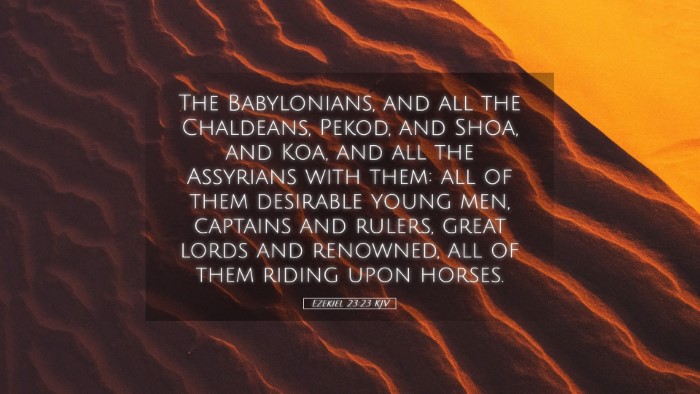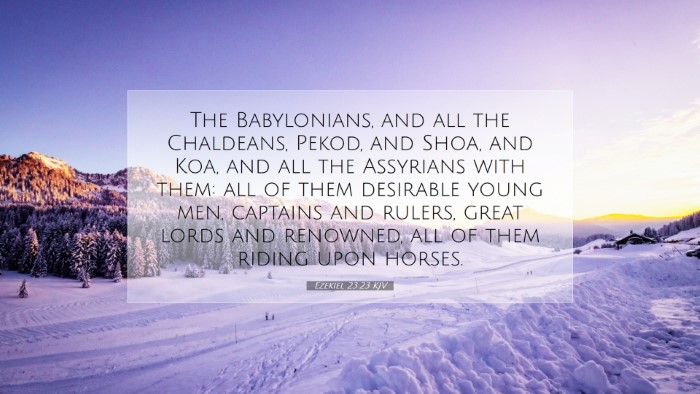Ezekiel 23:23: An Exegesis and Commentary
Ezekiel 23:23 states: “The Babylonians and all the Chaldeans, the men of the Assyrian, and all are desired young men, captains and rulers, great lords and renowned, all of them riding upon horses.” This verse is part of a symbolic narrative depicting the infidelity of Israel and Judah. In this commentary, we will analyze its significance through the insights of various public domain commentators including Matthew Henry, Albert Barnes, and Adam Clarke.
Contextual Background
This chapter utilizes strong sexual imagery to portray the unfaithfulness of God’s people towards Him. The two sisters, Oholah (representing Samaria) and Oholibah (representing Jerusalem), are described as harlots who have gone after foreign nations. This vivid portrayal is meant to convey the severity of their idolatry and spiritual adultery against God.
Insights from Matthew Henry
Matthew Henry emphasizes that the prophetic vision presented in Ezekiel aims to bring to light the grievous nature of Israel's infidelity. He notes that:
- The analogy of harlotry: This analogy signifies the unfaithfulness of Israel in turning away from God to pursue external alliances and idolatrous nations.
- The mention of Babylon and Assyria: These foreign powers symbolize the allure of worldly strength and security that captivated the Israelites, leading them away from reliance on God.
- The characterization of leaders: The text describes those who are entrapped by lusts and ambitions, depicting how leaders and great men became enamored with power rather than faithfulness to God.
Henry reminds readers of the importance of spiritual fidelity, warning against the seductions of worldly allurements that lead God’s people to deny their covenant relationship with Him.
Albert Barnes' Interpretation
Albert Barnes presents a scholarly examination of the characters and allegorical elements within Ezekiel 23:23. Key points from his commentary include:
- Symbolism of the nations: Barnes elucidates that the nations listed—Babylonians, Chaldeans, and Assyrians—represent a compilation of cultural and political powers that sought to entrap Israel and Judah.
- The nature of the leaders: The description of “young men, captains, and rulers” signifies the qualities that often attract others—youth, strength, and authority—and reflects a hollow allure devoid of true spiritual substance.
- Consequences of infidelity: Barnes is concerned with the resulting calamities that come from such unfaithfulness, noting that turning away from divine governance leads to downfall and devastation.
In summary, Barnes emphasizes the inevitable consequence of pursuing worldly nations, detailing that such pursuits will yield sorrow and judgment rather than the anticipated blessings.
Understanding Adam Clarke's Commentary
Adam Clarke offers nuanced theological reflections on the verse, providing insight into the historical implications and the spiritual truths contained within:
- Historical allusion: Clarke draws on historical accounts of Israel's alliances with foreign powers and the resultant impacts they had on the integrity and worship of Yahweh.
- Spiritual ramifications: He emphasizes that this verse serves as a dire warning against the duplicity that can infiltrate one’s faith, illustrating how the desire for worldly approval can lead to profound spiritual downfall.
- Call to repentance: Clarke interprets the verse not only as a condemnation but also as an invitation to return to God, urging faithful adherence to God's commandments over temporal desires.
Clarke's focus on repentance reiterates the theme of restoration that lies within the larger context of prophetic messages, calling believers back to a sincere relationship with God.
Theological Reflections and Applications
This verse encapsulates a profound truth regarding the nature of fidelity in the life of believers. As seen through the lenses of Henry, Barnes, and Clarke, several key themes emerge:
- Fidelity to God: The primary lesson is one of fidelity, underscoring the sacredness of one's relationship with God against the temptations of the world.
- Discerning true leadership: Effective leaders should inspire faithfulness to God rather than drawing people towards secular powers.
- Judgment and mercy: Understanding the implications of infidelity serves as both a warning and a call to embrace God’s mercy, fostering an environment of humility and repentance among believers.
Conclusion
Ezekiel 23:23 serves as a powerful metaphor for the spiritual condition of Israel and, by extension, a cautionary tale for contemporary believers. The insights from Matthew Henry, Albert Barnes, and Adam Clarke converge to illustrate a fundamental truth: faithfulness to God is paramount in a world rife with distractions and temptations. As we meditate on this verse, it calls us to examine our own allegiances and to ensure that our hearts remain steadfastly committed to the one true God.


